It's Hard to Be God
A Brief History of Man
We are stardust, we are golden
We are billion-year-old carbon
And we got to get ourselves
Back to the garden
~Crosby, Stills, Nash & Young
Since man invented writing he has longed for a past of his own creation. The Epic of Gilgamesh opens with the wild man Enkidu being civilized by the priestess Shamhat. After a week of wild sex domestication, he returns to the herd, irrevocably changed. “The gazelles saw Enkidu and darted off … his knees … went rigid … [his] understanding had broadened.” Moving beyond nature, he “sat down at the harlot’s feet, gazing into her face, his ears attentive as she spoke,”
“You are beautiful, Enkidu, you are become like a god.
Why do you gallop around the wilderness with the wild beasts?”
Enkidu follows. “Becoming aware of himself, he sought a friend.”1
This is the same story as Genesis, and though it permeates our culture, some naively still pine for Eden. On this count, Shamhat is right and Crosby et al are wrong. Having tasted of the Tree of Knowledge, we must ride the tiger of consciousness. We have become like God, and have no place in the Garden.
To think we can return is a gross misunderstanding of the past, the human condition, and the future we can build. In this essay, I want to set some things straight about the evolution of consciousness, and what to do about the Fall. This tour will follow the Greek Ages of Man, which roughly map on to Bicameral Breakdown and the Eve Theory of Consciousness.
The Golden Age
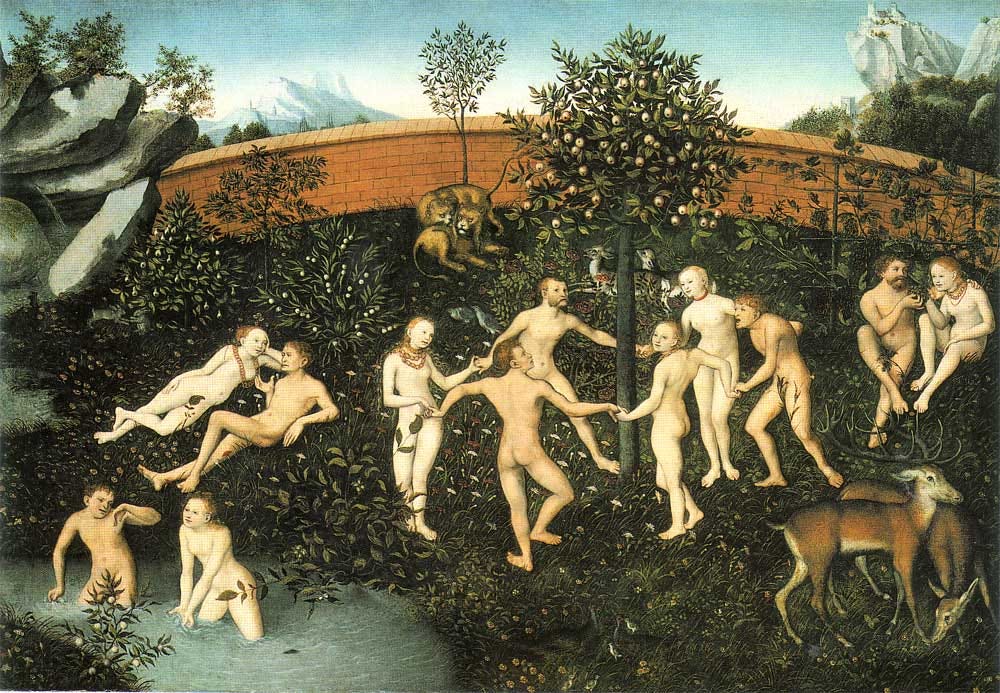
“In that time… the god himself was their shepherd, and ruled over them, as now men, being mortal, rule over other species which are of lesser nature… The earth gave them fruit in abundance of its own accord; they lived naked in the open air, having no beds but soft couches of grass…” ~Plato, Statesman
“And God among them walking, as a friend, through Eden’s happy groves his presence shone; To them thus Adam with submissive awe, And Eve, without distraction or fear, conversed.” ~Milton, Paradise Lost
The Golden Age was the last time humans lived as unreflective animals, freely wandering the land, following the herds, and gathering fruit in its season2. At this time man may have walked with god in the same way any other animal feels no separation from the rest of creation. Or man may have literally heard his inner voice as the voice of the gods. This was the Bicameral Age, before the strange loop of consciousness had bitten its tail, creating the internal space we call the self.
In some ways, life was better. As Jesus put it, “Consider the ravens: for they neither sow nor reap; which neither have storehouse nor barn; and God feedeth them.” But this is largely a skill issue. Lacking recursion, the minds of animals can’t be tied in knots, so they roll with the punches of a dog eat dog world. You could do the same after a lobotomy.
We shouldn’t give too much credence to nostalgia penned in the Iron Age. The Golden race was not really human. Closer to zombies whose reflexes had been hijacked by the voices in their head, eking out an existence at the Malthusian limit with their ragged band of cannibals. No self no rules. The Orphics knew:
“There once was a time when mortals were living like beasts, dwelling in mountainous caverns and sunless ravines…And carnivorous meals provided feasts of murderous slaughter; indeed, the Law was degraded, and Violence was enthroned with Zeus, and the weak were food for the strong.”
The Silver Age
“Sophia-Zoe breathed her power into the serpent, which became the wisest of all. He taught them so that they might attain the Perfect Man.” On the Origin of the World
“Then a second Generation, a much worse one, a later one, the Silver, was made by the gods who abide in their Olympian homes. They were like the Golden one neither in their nature nor in their power of perception. As a boy, each was be raised for a hundred years by dear mother, each one was playing around, quite inept [nēpios], at home. But when the time of maturing and the full measure of maturity arrived, they lived only for a very short time, suffering pains for their acts of heedlessness [aphradiai], since they could not keep overweening hubris away from each other, and they were not willing to care for the immortal gods.” ~Hesiod, Works and Days
Animals move through life on a kind of bodily autopilot, a closed circuit of sensing and acting that keeps them alive, and Golden Man was no different. The horror of the Fall was evolving just enough introspective power to turn toward that autopilot, to seek the agent behind the curtain and find only your self. God, it turns out, does not look after the raven, and “I” have made every choice of my life. We are all ultimately alone as we labor, lie, and kick against the pricks of fate.
But this makes it intellectual. The horror of the Fall was felt. It was an ontological shift; attention pointed back at itself became the bedrock of reality. Thousands of years later this would be formalized as “I think, therefore I am” by a man convinced animals could feel no pain. But the first people to inhabit “I” would have felt the alienation viscerally, having only lived in unity with the world up to that point. To live in your head is to withdraw from communion with nature and your fellow man.
As I noted in EToC v2, God would not have gone down without a fight. The self in the Silver Age would have been fractured: every tortured life a thirty years war. Decisions more of a dysfunctional group project than they are now. Cain is the man of the Age, discovering murder, then guilt3. He was quite literally possessed by Rage—Ares in the Jaynesian sense—when he smote Abel (cf. today schizophrenics commit homicide at ~18× the population rate). Remorse would have sunk its hooks in later, cursing him for life.
Because the Fall was a form of social intelligence, women were first to grasp the nature of the game. Hence Shamhat civilized Enkidu, Eve instructed Adam, and Pandora opened the box. Interestingly, Hesiod—hardly a feminist—portrays women as stewards of men in the Silver Age4. The phrase mega nēpios, translated above as “quite inept,” literally means “great baby.” Nēpios comes from nē- (“not”) + epos (“word”). Like Jaynes, I’m sympathetic to the idea that cognition terms in these epics preserve archaic mental structures, and “not-word” here recalls an extended pre-symbolic development in the Silver Age. In any case, to the Greeks nēpios referred to an infant too young to speak, and by Hesiod’s time it was used more generally for someone “childish,” “inexperienced,” or “foolish.”
So these prelinguistic man-babies lumbered through their first hundred years under the care of their mothers, and even when they came of age they stumbled into short, disastrous adulthoods5. Hesiod’s word is aphradiais, “without the capacity to perceive or plan,” precisely what a man would lack as he lurched into agentic life. Another translation has it: “Because of their lack of wits. They just could not stop hurting each other and could not bring themselves to serve the Immortals.” The misadventures of Herakles preserve how this played out.
His labors can be read as a memory from the Silver Age, when men were initiated into reflective life by women6. Like Adam, Herakles becomes as the gods, but the Greeks stay true to the ending. After the labors, Herakles goes mad, killing his wife and children. The mind-rending alienation of the Silver Age was often wrought by one’s own hands clumsily wielding agency. They just could not stop hurting each other. It’s hard to take the reins from God. Man in the Silver Age was part apex predator, part spirit committee, but not yet fully human. This was the worst time to be alive.
Bronze Age
“A third race followed, of sterner mind and disposition, more inclined to war, but not yet vile; it was the age of bronze.” ~Ovid, Metamorphoses
Ages are shorthand for the dominant state of mind of a culture, not spans of calendar years. Schizophrenics and primitive people inhabit a Silver Age mindset today7. By contrast, figures like Buddha and Jesus were vanguards of a future integrated Age, teaching well before their time. Likewise, Eve coaxed Adam into the Silver. Homo sapiens has always varied in sapience.
If we were to date the Silver Age, it would run from the advent of agriculture until men began to live and die by the sword around 3000 BC8. In the Bronze Age, myth and archaeology agree: men mastered organized violence, entering the niche of raping, pillaging, and plundering at scale. Yet the genetics tell a stranger story. It sounds like a winner-take-all world—Khans spreading seed, kings hoarding harems—but in fact, the Bronze Age shows a veritable explosion of male-line diversity. It was the Silver Age, not the Bronze, that erased 95 percent of Y-chromosome lineages. This suggests a genetic component to bicameral breakdown. In the Silver Age men whose minds could house an ego inherited the earth. Their descendants built the Bronze Age war machine, but its carnage was only an aftershock of the earlier meat grinder that shredded lineages as man evolved consciousness. Or not. Research will continue and time will tell9.
As for the Bronze Age itself, I don’t have much to say, other than that those who want to RETVRN are running a completely new type of delusion.
The Iron Age
“If only I did not have to be among the fifth generation of men, and if only I had died before it or been born after it—since now truly is a race of iron, and men never rest from labour and sorrow by day, and from perishing by night” Hesiod, Works and Days
LinkedIn has its roots in the Iron Age. On the plus side, this is also when humans finally figured out what to do about being alive. Writing had been invented millennia earlier, and with it the best minds could converse across time and space. Theory and practice accumulated, blooming into various flavors of enlightenment.
Through the Ages, our brains had evolved a stable set of smoke and mirrors to support a self. By the time we enter history this had solidified as the default mode of existence. Buddhism and the mystery cults of the Mediterranean world, Christianity included, are methods to see through the illusion, to ascend from Plato’s cave. These are not, however, methods to get back to the Garden, to gallop with the wild beasts.
What do you think it’s like to be a bat? A chimpanzee? Now, what do you think it’s like to be enlightened? Self-reflective consciousness allowed the greats to perceive how their minds construct reality, a view completely hidden to animals. Enlightenment may result in at-one-ment, but you have to be somebody before you can be nobody. The mirrors remain, if not the smoke.
Confusing enlightenment with regression is what Ken Wilber termed the Pre/Trans Fallacy.
Looking at both cultural and individual development, it became clear that we do not begin our lives in some integrated state, only to lose that integration as we grow. Rather, Ken saw that we begin our development in a state of pre-differentiated fusion or absorption with the environment, unable to distinguish where we end and where the rest of the world begins. We then begin to differentiate ourselves from our surroundings, dropping [sic] boundaries between self and other, inside and outside, mind and body, and so on.
This stage of differentiation was typically seen as the cause of all our sin and suffering—we ate the apple from the Tree of knowledge, learned to discern good from evil, and promptly got ourselves banned from a mythic Paradise. But according to this new evolutionary view, eating the apple was not a step down; it was a step up from Eden—a transition from the pre-differentiated fusion of the animal mind to the differentiated self-awareness, self-reflection, and capacity for choice that defines the human spirit, and only then to a state of genuine integration with the world and with nature—a true Enlightenment.
A true enlightenment, I would add, that wasn’t necessary until about 12,000 years ago, and wasn’t available until the Axial Age. 10,000 years wandering the desert, at odds with God.
The Snake Cults of Consciousness
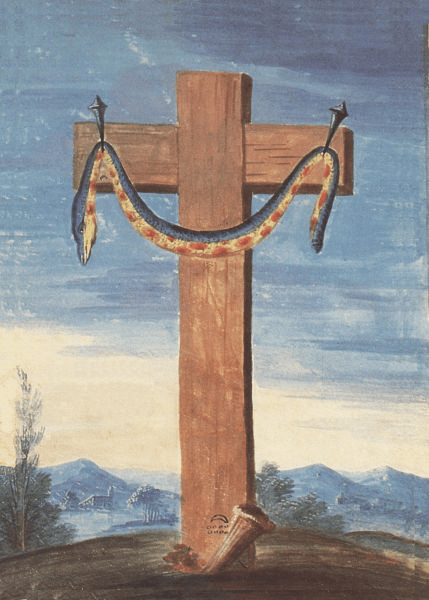
Jesus said he would be lifted up like Moses’ brazen serpent. The Naassenes, Sethians, Manichaeans, Peratics, Cainites, and Ophites went further, teaching that the serpent in Eden was Christ himself—the revealer who wakens the mind to its divine heritage. Complaining of the Ophites, Epiphanius writes, “They do not prefer the snake to Christ—they say the snake is Christ and worthy of the same veneration.”
To these groups Christ did not die for our sins, but rather was the sole path to the Father because he “had the words of eternal life.” He taught how one could become like god—the Perfect Man—through death and rebirth. A gnostic path that became flesh, as it were, in Jesus on the cross. But, we are all Christ. If you die before you die, you won’t die when you die. So take up the cross, brother. Become wise like serpents, and harmless as doves.
This heresy never died. Millennia later, alchemists (such as Flamel above), and later Jungians, used serpents as the symbol of self-transformation, drawing from many traditions, including the ophidian Eleusinian Mysteries10.
The East also has answers to the Fall. What do you notice about the Buddha?
In the storm after the Buddha’s enlightenment the nāga-king Mucalinda coils around him making a seven-hooded canopy so he can remain in samādhi11. Readers of the blog are the Elect who understand snakes are part and parcel of the grammar of consciousness because Eve used venom to pull our species up by its bootstraps.
Joking aside, there actually is an unbroken chain of consciousness-expanding cultural tech from the Paleolithic to modern religions, each Age’s innovations building on the last. Modern religions are made for men of Iron, sick with ego, because humans have evolved culturally and biologically. But they are still the Snake Cult, initiating one into a more complete view of one’s place in reality. This will come as a surprise to readers who associate Christianity with young earth creationism or penal substitution (i.e., Christ died for our sins). But the core of the tradition is an answer to the Fall in the union of the self with the Logos12.
The answer to selfhood is more explicit in Buddhism. Christianity frames the problem as separation from God and the cure as reconciliation; Buddhism says the basic error is taking a passing knot of experience to be a solid owner called “me.” Suffering follows from that mistake and from the clinging that comes with it. The point is not to regress to some pre-human harmony, but to recognize how thoroughly this habit colonizes experience and keeps the system turned in on itself.
In that sense Buddhism and Christianity are two mature Snake Cults studying the same selfish meme: the ego, a self-maintaining pattern that expands to fill whatever space it can. Christianity talks in terms of relationship and adoption into the Logos; Buddhism talks in terms of emptiness and dependent origination. I don’t want to serve some “mystical slop at the end of history,” but they do agree on this much: you do not get out of the Fall without dying to who you think you are.
It is vital to understand our genesis. If there is one replicable finding in anthropology it’s that every culture needs a creation myth. Man is as much story as flesh; he does not live on bread alone. Our origin story will necessarily include some delusions and half truths, but the closer we can approximate reality the greater heights we can achieve.
The Apocalypse of Drew
The story of our species is tying our attention in a knot, and then learning how to untangle our selves. We are a young species yet, barely born again, and the great reveal (or, to use the Greek, apocalypse) has not been written. For my money, the singularity started when subjectivity bit its own tail, ending the Golden Age. Things were touch-and-go in the Silver, but by the Bronze, the ego had evolved into a stable loop. But this is only a local minimum. We may pity the delusions of the Silver man; our descendants will do the same to us.
In the long run, consciousness will keep expanding, pulling more and more of the observable universe into its orbit. Looking inward, the intrinsic perspective will be understood with more clarity and experienced with more equanimity. Individuals will grok how they relate to themselves, each other, and the material world. Expanding outward, our children will populate the galaxy: a billion billion space Buddhas. It may sound like science fiction—a Big Bang of consciousness starting from Earth—but imagine explaining 8 billion Eves to someone in the Paleolithic. Or, from first principles, if the universe wants to know itself, what other future is there?
In contrast, many of my fellow travelers who mine myths for history would like to return to the ways of the Ancients, to Nature, to a wholeness their bones almost remember. Terence McKenna introduced the Stoned Ape Theory in Food of the Gods: The Search for the Original Tree of Knowledge. Largely forgotten, he also used the opportunity to argue Billions Must Die. He wants to return to the Stone Age, to Eden, where women reigned and love was free. And, importantly, the last time the global population was sustainably in the hundreds of thousands, as the great fungi in the sky intended. His heart was filled with too much hate for Christianity, the patriarchy, and the whole human project to recognize that we are not a scourge13, and our redemption is more or less a solved problem. Trust the plan, Terence; it’s right there in the Bible. The path is arrayed before us, and there’s no way off this train.
I don’t mean to be flippant. As any good millenarian knows, there is all sorts of Trouble Getting to Solla Sollew. In the 1800s my ancestors marched off into the desert to build Zion in Utah, and were ultimately disappointed14. You can’t opt out of history or skip to the end, but we have made progress as a species. Further, it is healthy to recognize that enlightenment will come out of the same system of thought that has elevated our species from the beginning. I’m sorry to say, but it’s going to be extremely boring: loving your neighbor as yourself, the Four Noble Truths, taking up the cross. There is no need to reinvent the wheel or trust some cult leader—no secret key, no hidden mantra that hasn’t been documented ad nauseam for the past 2,000 years. As Malachi prophesied, the hearts of the children will turn to their fathers. Or, in this case, mothers. An unbroken chain back to Eve, back to Sophia-Zoe, the Mother of All Living.
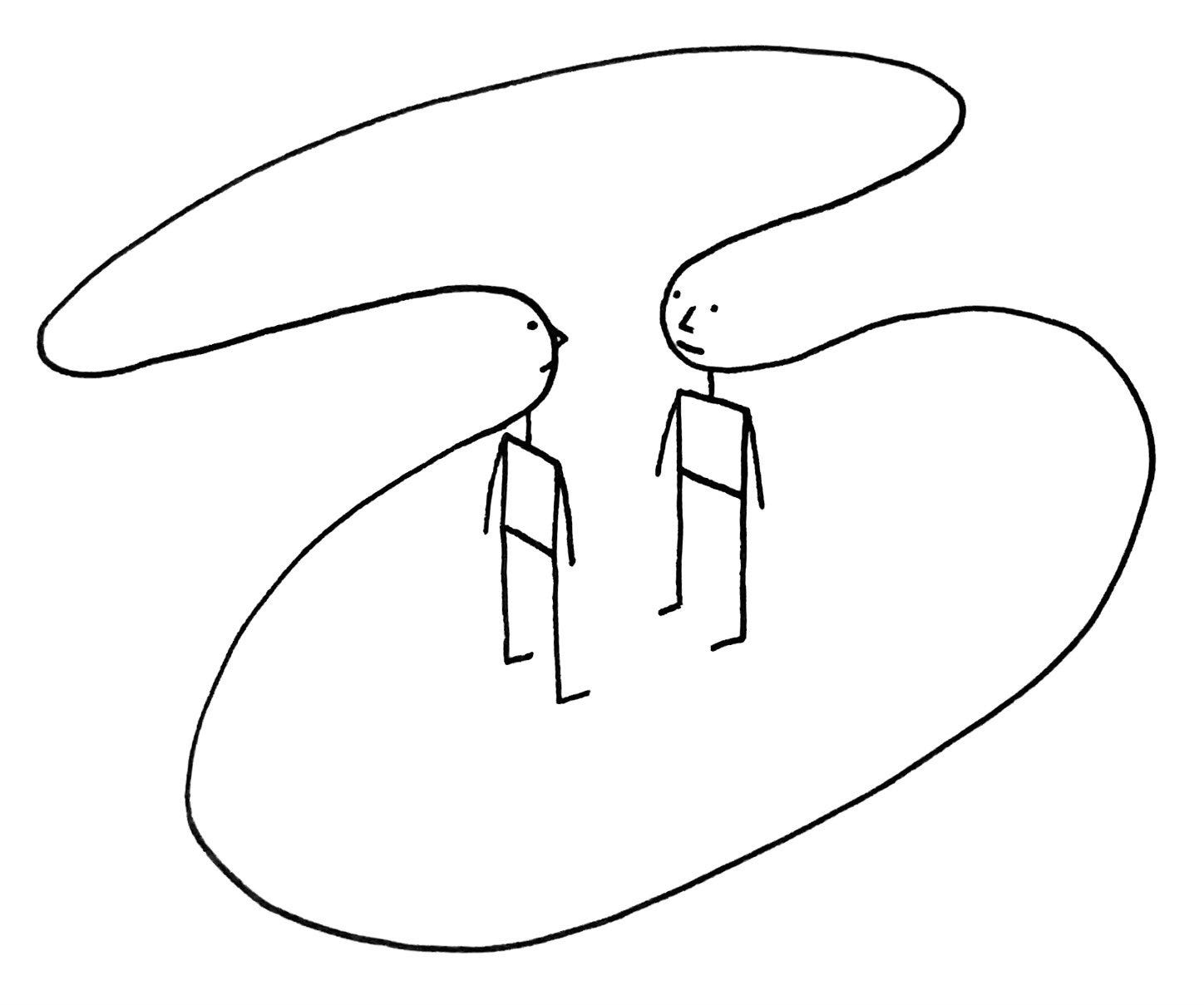
This follows the mainstream Maureen Kovacs translation. In her Note on Translation she describes her goal as a “somewhat literal rendering of the Akkadian words, grammar, and images.” As she notes, “all translation is interpretation,” a difficulty magnified when dealing with a four-thousand-year-old text whose notions of “self” differ radically from our own.
The same applies to the Vedic Golden Age: “In Satya-yuga… there was no concept of dharma or adharma, for people were naturally righteous.” — Vāyu Purāṇa.
Gen 4:13 can be translated as either:
“My punishment is greater than I can bear”
“My guilt is too great to be forgiven”
A possible description of unequally yoked sexes in the Silver Age:
“The Nephilim were on the earth in those days—and also afterward—when the sons of God went to the daughters of humans and had children by them. They were the heroes of old, men of renown.” ~Genesis 6:4
Sons of God being men who heard voices, at a time women were proper humans. This is pre-flood, so would be part of a generation of men that was wiped out around the end of the Ice Age. Not going to hang my hat on that but gosh, it is a strange, archaic, verse.
100 years of pre-pubescence is an interesting detail. If you ever experience ego death one of the most remarkable surprises, apart from not existing, is the phenomenology of time. Seconds can drag on for hours. The present moment fills eternity. Other disruptions of the self like schizophrenia and dementia can do the same (how long, phenomenologically speaking, will you spend in a nursing home?). So perhaps when selfhood was achieved later in life, it would have felt like most of your life was lived in the eternal, mindless state, with adulthood only a sorry epilogue. Life is still like this, to an extent. One’s 40s pass faster than one’s teens.
Herakles (lit. the glory of Hera), is guided on a series of purifications, about half of which involve snakes. In the penultimate labor, he steals Hera’s apple of immortality from a tree guarded by a snake. He is then initiated into the Eleusinian Mysteries before his ultimate task, descending to hades to subdue the snake-tailed Cerberus. Classicist Carl Ruck, who coined the term entheogen, thinks the labors are code for secret rites that employ snake venom to visit the spirit world.
In fact, primitive cultures are often explicitly schizophrenic. Consider the paper Nga Whakawhitinga (standing at the crossroads): How Maori understand what Western psychiatry calls ‘‘schizophrenia’,’ which, includes some interviews.
For me hearing voices is like saying hello to your whanau [family] in the morning it is nothing unusual. (CSW)
My understanding of that is that I absolutely accept that if someone tells me that they see someone standing in the room that I can’t see that there actually is. They actually can see it. I understand that. (KAU/MAN).
They come to me when things are about to get bad... they sometimes tell me what to do and if I do it then I get through. I used to think them coming meant I was going crazy again but now I realize that when times were tough, they were there to help me through. (TW) Yep a lot of them have something that needs to be done. You will know when you’re supposed to do it, they’re not subtle, they will show you what you need to do and they won’t stop until you do it. (TW)
Or The Descent of Man:
Dr. Landor acted as a magistrate in West Australia, and relates, that a native on his farm, after losing one of his wives from disease, came and said that, “he was going to a distant tribe to spear a woman, to satisfy his sense of duty to his wife. I told him that if he did so, I would send him to prison for life. He remained about the farm for some months, but got exceedingly thin, and complained that he could not rest or eat, that his wife’s spirit was haunting him, because he had not taken a life for hers. I was inexorable, and assured him that nothing should save him if he did.” Nevertheless the man disappeared for more than a year, and then returned in high condition; and his other wife told Dr. Landor that her husband had taken the life of a woman belonging to a distant tribe; but it was impossible to obtain legal evidence of the act.
“And unto Adam he said, Because thou hast hearkened unto the voice of thy wife, and hast eaten of the tree, of which I commanded thee, saying, Thou shalt not eat of it: cursed is the ground for thy sake; in sorrow shalt thou eat of it all the days of thy life;
Thorns also and thistles shall it bring forth to thee; and thou shalt eat the herb of the field;
In the sweat of thy face shalt thou eat bread, till thou return unto the ground; for out of it wast thou taken: for dust thou art, and unto dust shalt thou return.” Genesis 3:17–19
Many traditions tie the end of paradise to the rise of agriculture (interestingly, wheat was domesticated where Eden is described). Hesiod twice preserves the same memory: before Pandora, mortals “lived like gods” without toil, and in the Golden Age “the grain-giving earth bore fruit of its own accord.” Plato’s Statesman echoes it with an age when the earth “spontaneously” produced all food until the cycle turned and men had to labor. Ovid makes the contrast explicit: in the Golden Age the “untilled earth” yielded freely, later ages invent ploughs and property. Purāṇic summaries of Liṅga Mahāpurāṇa 39 likewise note that when natural abundance waned, people first built houses and “learned agriculture.” In China, Zhuangzi’s age of Perfect Virtue imagines humans living like animals without tools or cultivation, with agrarian technique belonging only to the fallen world that follows.
I write because we will eventually know what happened and I want to anchor EToC to reality. As genetic sampling expands and models sharpen, the story of the Y-chromosome bottleneck will come into focus. Already, autosomal studies show a steep decline in schizophrenia and a rise in general intelligence from the Golden Age to now. One geneticist on that paper predicted a coming Copernican revolution in our understanding of human evolution, likening these methods to the invention of the telescope. Whether that shift supports the Eve Theory of Consciousness is anyone’s guess, but it will almost certainly involve self-domestication and self-reflection. The notion that evolution stopped 50,000 years ago—just when humans began behaving like humans—is untenable.
Cicero is not waxing eloquent when he says:
“For it appears to me that among the many exceptional and divine things your Athens has produced and contributed to human life, nothing is better than those Mysteries. For by means of them we have been transformed from a rough and savage way of life to the state of humanity, and have been civilized. Just as they are called initiations, so in actual fact we have learned from them the fundamentals of life, and have grasped the basis not only for living with joy, but also for dying with a better hope.” M. Tullius Cicero, De Legibus, ed. Georges de Plinval, Book 2.14.36
The strangest thing is that the bullroarer, employed at Eleusis, was also used worldwide in the ceremonies that teach about how man came to be. As anthropologist Jean Servier notes:
“From Australia to both Americas, passing through Africa, Oceania, and Europe—from the Magdalenean man to the carpenter or stonemason Companion who vigorously spins his bullroarer—another question confronts us: that of the unity of an initiatory tradition and a primordial teaching. For this time, even in the name of “rationalism,” we cannot appeal to “luck,” “chance,” or “coincidence.””
Yogic traditions are more explicit. The serpent goddess Kundalinī Śakti lies coiled at the base of the spine, the latent power of creation and consciousness. When stirred through discipline or grace, she ascends through the chakras, illuminating each in turn until she reunites with Śiva, pure awareness, at the crown—where duality dissolves. As the Kularnava Tantra says, “She is the power that binds the soul to the wheel of birth, and she is the power that sets it free.” Or as Jung put it, “The ascent of Kundalinī is the psychological process of becoming conscious.”
One can accept the utility of religion psychologically a la Jung or Joseph Campbell, but it’s easier to participate if you accept some metaphysical claims. The Christianity I’m describing treats reality as relational and participatory, a world disclosed by our involvement in it, articulated by thinkers like John Vervaeke and Ian McGilchrist. Or, for something a little more classic: In the beginning was the Word and the Word was with God and the Word was God.
Granted the idea of “dominion” over the natural world is indeed problematic. Anthropocene extinction and factory farming are in fact scourges, but these will be addressed by sensitive humans wielding technology more than by depopulation.
Other than establishing the world’s largest breeding program for Bible fan fiction enjoyers.



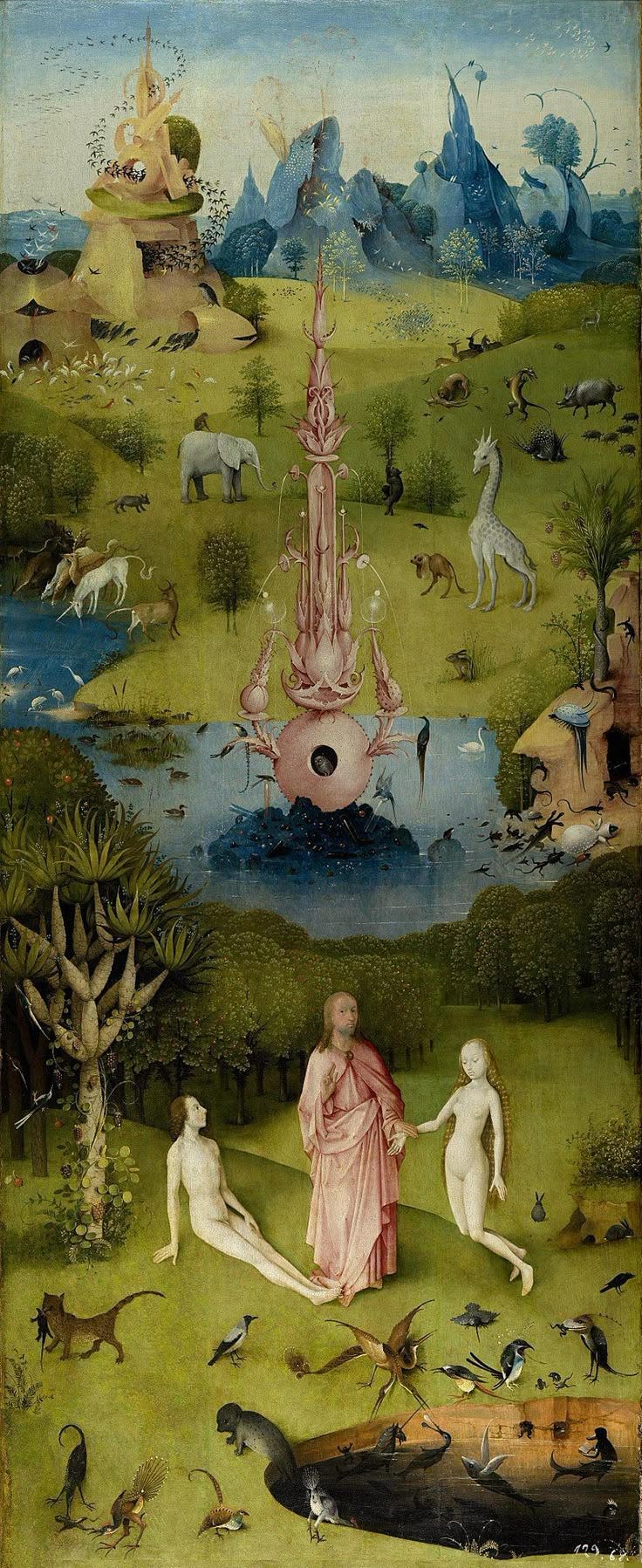
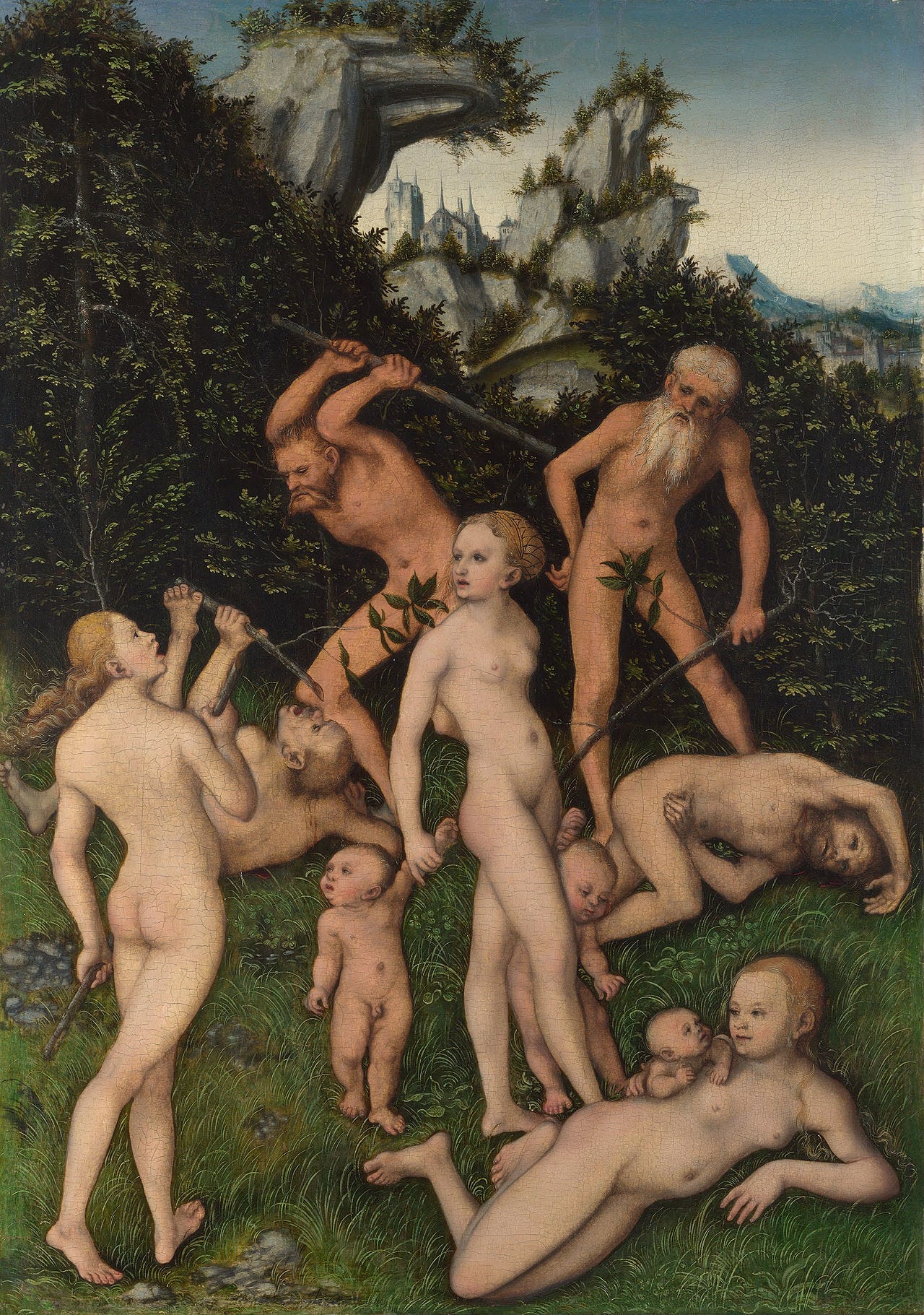

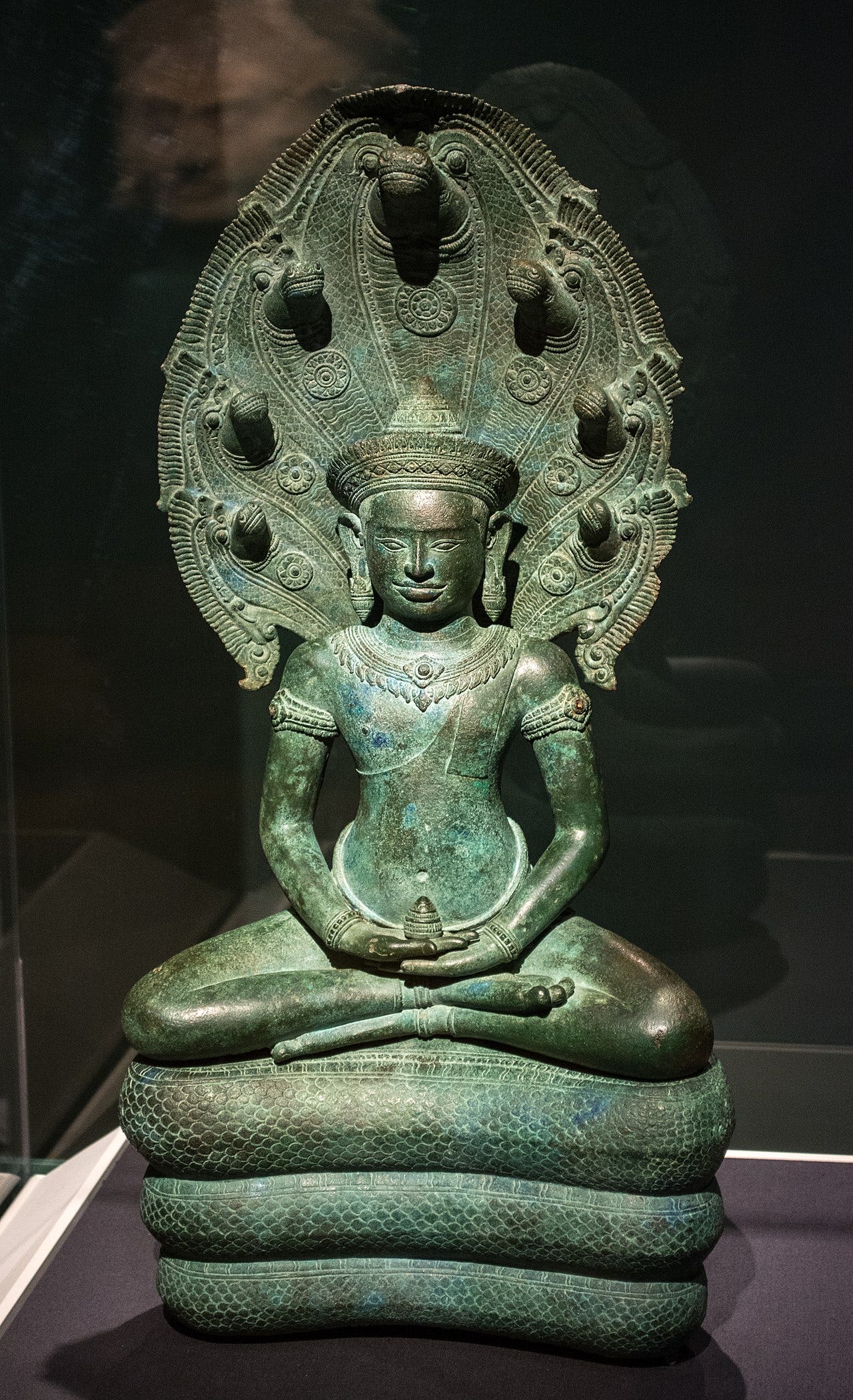
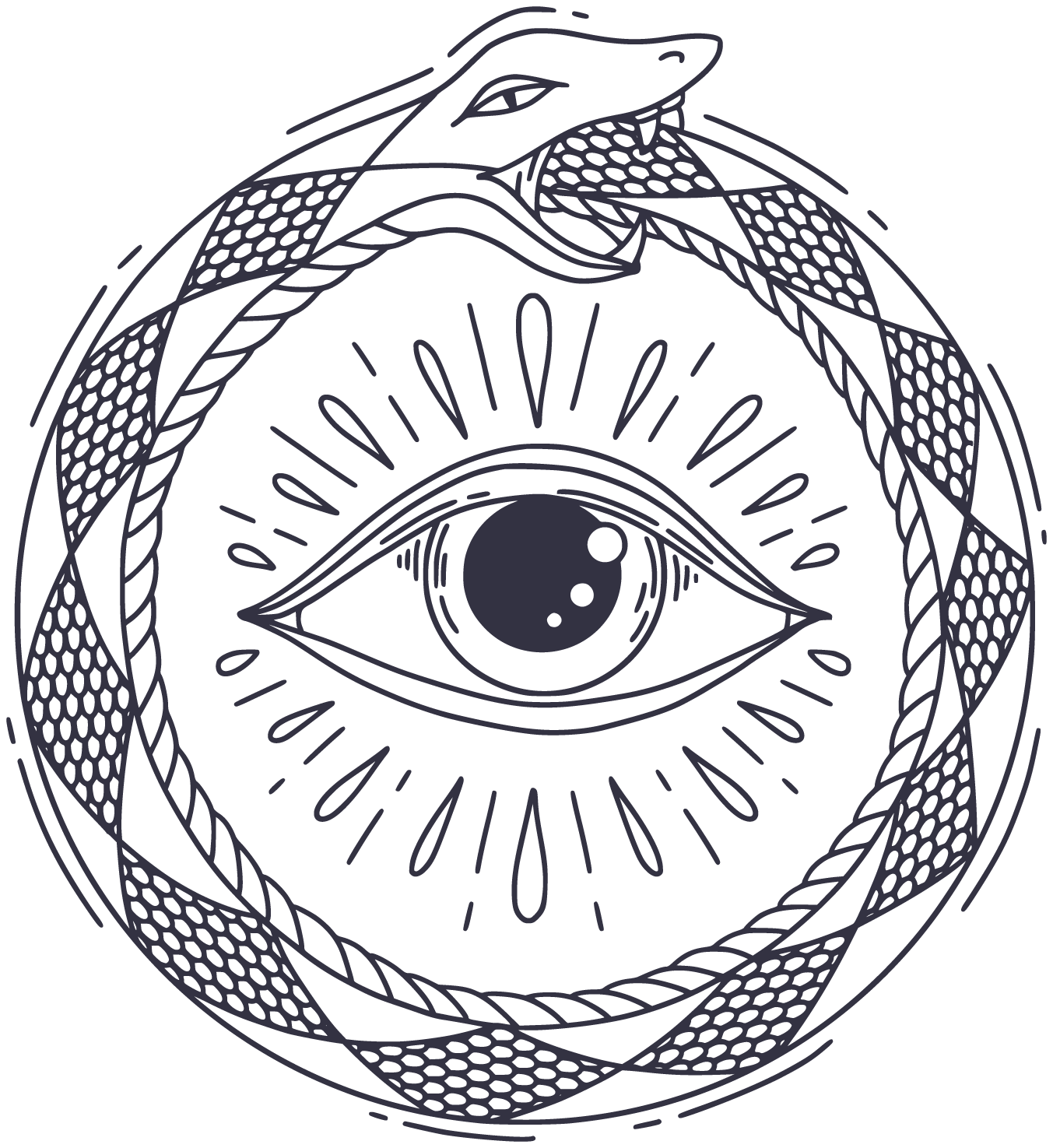
“Animals walk around in a state of permanent religious intoxication. This is the natural condition of the mind and intellect, the moment-to-moment perception, of man as well. I heard some computer fool say that religion is the 'older virtual reality' experience, to justify his scam industry. No, the denuded state of the spirit and intellect, where you walk around 'demystified' and 'disenchanted' is the virtual reality condition, and a terrible condition at that.”
― Bronze Age Pervert, Bronze Age Mindset
https://www.elconfidencial.com/alma-corazon-vida/2022-01-12/medusine-mujer-sirena-serpiente-mito-europa_3355982/
Melusine: me ha parecido fantástica la historia de esta mujer mitad humana, mitad serpiente de cintura para abajo, solo cola, no cabeza ni colmillos, ni ojos de serpiente. El enlace de arriba es un poco básico pero muy bien descrito y bien escrito. Espero que te sirva para algo. Cada vez que leo algo sobre "bichas" (como decía mi abuela, la más campera de las dos abuelas que uno suele tener), te escribo o te voy a escribir, y por supuesto algo que sea transcendental ahora mas que nunca para la humanidad. Gracias.
Hay algo que me llamó la atención en un dibujo del artículo y es que a veces se representaba con dos colas que casi la bordean y me recordó al bronce Carriazo, un "bocado" de caballo (creo recordar) tartesso representando a Artemisa. Búscalo por "bronce Carriazo" encontrado en la provincia de Sevilla por aquel catedrático en los años 50 del siglo pasado. Gracias. A ver si un día escribes algo sobre la enigmática cultura tartésica, un misterio del suroeste de la península ibérica donde abundan las "bichas". Gracias de nuevo.